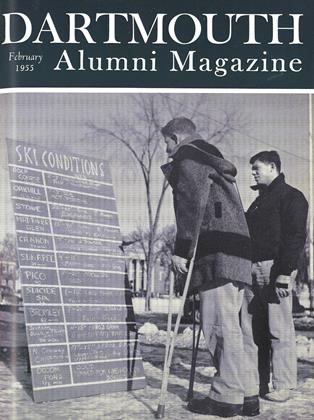Sending a missile from the earth to outer space is a not improbable, although very costly, form of air travel, according to Dr. Russell K. Sherburne '43, research physicist at the University of New Mexico. A specialist on rockets and guided missiles, Dr. Sherburne has been making an educational sequence for television audiences, under the sponsorship of the Ford Foundation, in Dallas, Texas.
Up to the present, the experiment of sending a rocket as far into space as 150 miles has not been made, partly because of the cost and partly because of the difference of opinion among scientists as to the workability of the project. Dr. Sherburne believes that both objections may be soon overcome.
In an interview with The DallasTimes Herald, Dr. Sherburne stated that any unmanned rocket taking off for outer space would probably be about the size of a basketball, as a big missile would take too much fuel. "Multi-stage rockets would take it on its journey," he said. "At 150 miles, the satellite could stay there about four days before it settled back down to earth." Finding out where it landed would be the next problem.
Rockets are now being sent up a hundred miles and even more to record data on density, radiation from the sun, ionization and pressure. Space travel by human beings, Dr. Sherburne believes, is still too uncertain to warrant prophecy.
 View Full Issue
View Full Issue
More From This Issue
-
 Feature
FeaturePublic Interest an The Technological Revolution
February 1955 By LLOYD V. BERKNER -
 Feature
FeatureMan's Aggressive Nature
February 1955 By GEORGE E. GARDNER '25 -
 Class Notes
Class Notes1918
February 1955 By ERNEST H. EARLEY, W. CURTIS GLOVER, RICHARD P. WHITE -
 Class Notes
Class Notes1923
February 1955 By CHESLEY T. BIXBY, CHARLES H. JONES JR., TRUMAN T. METZEL -
 Class Notes
Class Notes1926
February 1955 By HERBERT H. HARWOOD, H. DONALD NORSTRAND, RICHARD M. NICHOLS -
 Article
ArticleThe Underĝraduate Chair
February 1955 By G. H. CASSELS-SMITH '55
Article
-
 Article
ArticleAMERICAN UNIVERSITY UNION ELECTS OFFICERS FOR 1922
December 1921 -
 Article
ArticleASSOCIATIONS OF SECRETARIES
June 1925 -
 Article
ArticleNew College Movies
January 1935 -
 Article
ArticleInvestor Research Consortium
FEBRUARY 1973 -
 Article
ArticleClub Calendar
MAY • 1987 -
 Article
ArticlePRESIDENT RED SOX FAN
June 1936 By Robert P. Fuller '37

